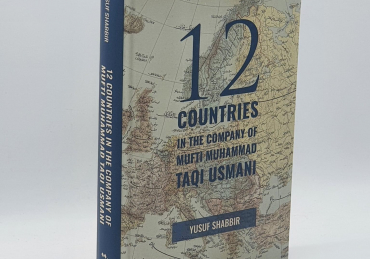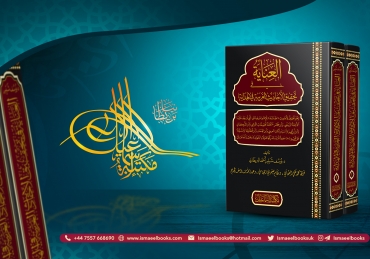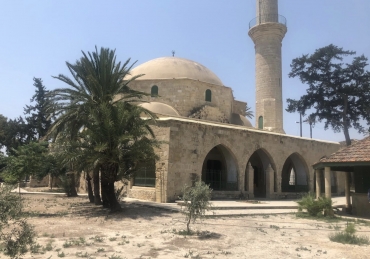UK Tour 2018: Discourses of Shaykh al-Islām Mufti Muḥammad Taqī ʿUthmānī
بسم الله الرحمن الرحیم
Over the past week, I have had the unique opportunity to spend time and travel with Shaykh al-Islām Mufti Muḥammad Taqī ʿUthmānī (b. 1362/1943) and benefit from his ocean of knowledge and wisdom. Mufti Muḥammad Taqī ʿUthmānī requires no introduction. He is the world’s leading authority on Islamic jurisprudence, whose published works in Arabic, English and Urdu are renown worldwide. I thought it would be beneficial to translate some of his malfūẓāt (discourses) rendered in his programmes as well as one to one discussions.
To listen to his audio speeches during this visit, click on the following link: http://islamicportal.co.uk/mufti-muhammad-taqi-usmani-speeches/.
Advice for students and scholars
- Mufti Muḥammad Taqī ʿUthmānī said, “Do not regard yourself as an ʿĀlim (scholar). Regard yourself as a student.”
- Mufti Muḥammad Taqī ʿUthmānī said, “Mawlānā Idrīs Kāndhelwī would say: The reason for strife among scholars is ḥasad (jealousy).”
- Mufti Muḥammad Taqī ʿUthmānī said, “Tafaqquh (profound understanding) cannot be attained just by reading books. It requires extensive practice and the ṣuḥbah (company) of an expert Mufti for a long duration. This applies to all sciences. Expertise in any subject is acquired through ṣuḥbah.”
- Mufti Muḥammad Taqī ʿUthmānī said, “The label Mufti has become so common and cheap. A Mufti is not simply the one who has studied the dars niẓāmī. It is the one who has stayed in the company of an expert Mufti for a long period of time and acquired profound understanding as a result.”
- Mufti Muḥammad Taqī ʿUthmānī said, “My father Mufti Muḥammad Shafīʿ Ṣāḥib would receive questions over the phone. I would assist and take the phone calls. Initially, he would take the phone off me and listen to the question directly and answer to ensure that there is no miscommunication in relaying the question or the answer. Then a time came that he would allow me to relay the question and also relay his answer. On one occasion, I answered the question without referring it to him as the answer was obvious. When he found out, he rebuked me, not because the answer was wrong, rather because I did not have the permission or the authority from him to answer questions.”
- Mufti Muḥammad Taqī ʿUthmānī said, “Until the demise of my respected father Mufti Muḥammad Shafīʿ Ṣāḥib, I would show him whatever I would write, every fatwa, every article, and he would check it.”
- Mufti Muḥammad Taqī ʿUthmānī said, “When Shaykh ʿAbd al-Fattāh Abū Guddah visited Pakistan, he commented: Every person here is a doctor, and every person is a Mufti.”
- Mufti Muḥammad Taqī ʿUthmānī said, “Issuing Fatwa and using the Mufti title should not be taken lightly. Imam Mālik said, ‘I did not issue legal verdicts until seventy [scholars] testified that I am capable of doing so.” [Hilyah, 6:316].
- Mufti Muḥammad Taqī ʿUthmānī said, “Studying books alone is insufficient. The blessings that are acquired by studying with a teacher are not attained by studying alone, even if it is just reading the text of a book to a teacher without explanation. Allah Almighty is the one who grants knowledge, however, it is His practice to grant knowledge via a person. In addition to this, Allah Almighty grants the teacher knowledge due to the blessing of the student’s zeal and passion, similar to how the more the baby cries, the more the milk will come in the mother’s chest.”
- Mufti Muḥammad Taqī ʿUthmānī said, “My mentor, Dr ʿAbd al-Ḥayy ʿĀrifī once said: There is a train that travels from Karachi to Lahore, it is very clean and travels fast. As it is about to leave Karachi station, an old dirty carriage is attached to the end of this train. As the train departs, the old carriage starts to squeak and make noises. The old carriage is asked: Where are you going with these new carriages? It replies: You are laughing at me because I am old and poor. However, I will also reach Lahore when the new carriages reach Lahore, because my buffer is attached to them. The morale of this is that we should connect ourselves to the pious servants of Allah whether it is via Isnād (chains of ḥadīth) or via spiritual chains. The ḥadīth states, ‘A person shall be with whom he loves.’”
- Mufti Muḥammad Taqī ʿUthmānī said, “My father Mufti Muḥammad Shafīʿ Ṣāḥib would say: Never appoint a teacher at Darul Uloom who is already teaching at another Darul Uloom. This is not a business. If he decides to leave and you appoint him, this is a separate matter.”
- Mufti Muḥammad Taqī ʿUthmānī said, “Whoever you have a difference with, go and meet them. Either the difference will end or at least the difference will not become enmity and discord. My father would visit and meet with other sects.”
- Mufti Muḥammad Taqī ʿUthmānī said, “If someone has done something inappropriate, do not humiliate them. If necessary, then clarify the issue without taking the person’s name. Clarify but do not disgrace. This is what the ḥadith of niyyah & the story of Muhājjr Umm Qays teaches. The Prophet ﷺ would say, ‘what has happened to people who do such and such’ without mentioning names.”
- Mufti Muḥammad Taqī ʿUthmānī said, “Differences of opinion should not result in quarrels, groupings, sectarianism or discord. Do not be disrespectful or fire arrows.”
- Mufti Muḥammad Taqī ʿUthmānī said in relation to differences of opinion and dealing with other groups, “First, research the issue from their primary sources. Do not rely on secondary sources. Second, once this is established, any response should not lead to enmity.”
- Mufti Muḥammad Taqī ʿUthmānī said, “If knowledge does not result in selflessness and humility, this is not [true] knowledge, it is ignorance.”
- Mufti Muḥammad Taqī ʿUthmānī was asked regarding some people who make secret recordings of durūs and circulate it on social media with a refutation, “This is what creates fitnah. Do not spread fitnah. Go and meet the person and seek clarification. It is wrong to publicise in this way.”
- As we came off the train in Windermere and were observing the train track, Mufti Muḥammad Taqī ʿUthmānī said, “My father Mufti Muḥammad Shafīʿ would say: Do not think slight inḥirāf (deviance) is not serious. When the train track deviates even slightly, the direction becomes totally different eventually as the journey continues.”
- Mufti Muḥammad Taqī ʿUthmānī said, “Ḥakīm al-Ummah Mawlānā Ashraf ʿAlī Thānawī was of the view that to have Q&A after rendering advice to the general public dilutes the effects of the advice.”
- Mufti Muḥammad Taqī ʿUthmānī said, “Ḥakīm al-Ummah Mawlānā Ashraf ʿAlī Thānawī would not mention complicated masāʾil (rulings) in his speeches.”
- Mufti Muḥammad Taqī ʿUthmānī said, “If someone asked Ḥakīm al-Ummah Mawlānā Ashraf ʿAlī Thānawī a question during his travels, he would always refer the person to the local Muftis.”
- Mufti Muḥammad Taqī ʿUthmānī said, “Do not write Deobandi after your name. My father stopped my elder brother Mufti Muḥammad Rafīʿ Ṣāḥib from writing ‘Muḥammad Rafīʿ Deobandī’ although we are Deobandi by birth and lineage. This is because there is an odour of sectarianism in it. Deoband is not a separate group. It is a manifestation of ما أنا عليه وأصحابي. Therefore, the ‘Deobandi’ title is disliked. If necessary say: follower of the scholars of Deoband.”
- Mufti Muḥammad Taqī ʿUthmānī said, “When writing a Fatwa and the issue is clear, for example the prohibition of alcohol, then write the verse or the ḥadīth as opposed to quoting al-Durr al-Mukhtār.”
Current Affairs
- Mufti Muḥammad Taqī ʿUthmānī said, “My respected father Mufti Muḥammad Shafīʿ Ṣāḥib would recall the statement of Ḥājī Imdād Allah (may Allah have mercy on him): There are two prerequisites for Ittiḥād (unity): (1) Tawāḍuʿ (humility) (2) Īthār (giving preference to others over oneself).”
- Mufti Muḥammad Taqī ʿUthmānī said, “In the ḥadīth al-raḥmah, al-Rāḥimūn (those who have mercy) is general and includes humans, animals and all the creation of Allah. Further, ‘have mercy on those who are on earth’ includes Muslims and non-Muslims.”
- Mufti Muḥammad Taqī ʿUthmānī said, “Having mercy on non-Muslims could be in two ways (1) Supporting them during their difficulty (2) Feeling sorry for them and having the passion and ardent desire that Allah guide them. We are negligent in this regard and do not have this feeling.”
- Mufti Muḥammad Taqī ʿUthmānī said, “Let alone having mercy on non-Muslims, we do not have mercy on those whose maslak (school) is different. Rather, there is animosity. A slight difference of opinion and we split. This has destroyed us. Yes, critique with affection, however, do not regard the person an outsider.”
- Mufti Muḥammad Taqī ʿUthmānī said, “A pious saint would say: Our faith has become poor. Appreciate anyone who is serving the faith.”
Durūd and supplications
- Mufti Muḥammad Taqī ʿUthmānī said, “Turn to Allah and ask Him for all your needs, whether big or small.”
- Mufti Muḥammad Taqī ʿUthmānī said, “When the Hadith is being recited, صلى الله عليه وسلم should be read clearly.”
Fiqh
- Mufti Muḥammad Taqī ʿUthmānī said, “The blessed city of Madinah is ḥaram similar to Makkah except that there are some differences in the rulings of both ḥarams. ʿAllāmah Anwar Shāh Kashmīrī suggests that to say Madinah is not ḥaram is an inappropriate expression.”
- Mufti Muḥammad Taqī ʿUthmānī said, “One of the points for the boundary of the ḥaram of the blessed city of Madinah is Thawr. Some people have suggested this is an error as Thawr is the famous mountain near Makkah. However, this is not correct. I have visited the small mountain of Thawr in the blessed city of Madinah which lies behind mount Uḥud on its eastern side.”
- Mufti Muḥammad Taqī ʿUthmānī said, “Photography should not be used in gatherings of scholars as it is against the sanctity of the gathering.”
- Mufti Muḥammad Taqī ʿUthmānī said, “There are both views regarding digital photographs. However, to take someone’s photograph without their permission is wrong.” My father Mufti Shabbīr Aḥmad (b. 1376/1957) who was present in the gathering commented that this is a form of backbiting.
- I asked Mufti Muḥammad Taqī ʿUthmānī regarding the view of his respected father in relation to the obligation of Ṣalāh if the time of the Ṣalāh does not occur and what is stated in Majālis Ḥakīm al-Ummah. Ḥaḍrat Mufti Ṣāḥib replied, “There are both views within the ḥanafī school of thought. However, the preferred view is that Ṣalāh is necessary and this was the final position of my respected father. ʿAllāmah Shihāb al-Dīn Marjānī has a beneficial book on this subject, I have summarised the discussion in Takmilah Fatḥ al-Mulhim.” [Tr. Note: For further reading, click on the following link: http://islamicportal.co.uk/time-of-salah-does-not-occur-or-salah-time-re-enters/].
- Mufti Muḥammad Taqī ʿUthmānī said, “The muftā bihī position is that employees of private charities and NGOs do not fall under the ʿĀmilīn category.”
- Mufti Muḥammad Taqī ʿUthmānī said, “If someone performs Witr Ṣalāh in ḥaramayn behind the Imam and follows him by making two salāms, there is a view within the ḥanafī school that it is valid. This can be practiced upon. There is no need to create discord. Both methods are established from the ḥadīths.”
- Mufti Muḥammad Taqī ʿUthmānī said, “Those people who act according to the view of mithl awwal, this is not against the ḥanafī school of thought.” [Tr. Note: For further reading, click on the following link: http://islamicportal.co.uk/travelling-on-plane-and-performing-asr-salah-at-mithl-awwal/].
- Mufti Muḥammad Taqī ʿUthmānī said, “I do not share the view of combining prayers (Jamʿ bayn Ṣalātayn). My Arab friends knows this. Sometimes when I attend meetings in the Arab world, they request me to lead Maghrib Ṣalāh. Subsequently, they perform ʿIshāʾ Ṣalāh behind another Imam and I do not perform ʿIshāʾ Ṣalāh. I move back and join in with them with the intention of Nafl Ṣalāh. They know my stance regarding this. However, I combine prayers (Jamʿ Haqīqī) in two scenarios. First, I regard it permissible to combine prayers between Mithl Awwal and Mithl Thānī and between Shafaq Aḥmar and Shafaq Abyaḍ for a traveller and ill person, as is the view of ʿAllamah Kashmīrī, and there is leeway for this in the ḥanafī school. Second, if there is fear of Ṣalāh being missed for example because of travelling on an aeroplane, I combine prayers based on the position of Imam Shāfiʿī and what ʿAllāmah Ibn ʿAbidīn has mentioned regarding acting upon this because of necessity.” [Tr. Note: For further reading, click on the following link: http://islamicportal.co.uk/combining-prayers-according-to-elders-of-deoband/.]
Ḥadīths
- Mufti Muḥammad Taqī ʿUthmānī said, “According to the muḥaqqiqun (experts), the hadith من رآني في المنام فقد رآني (whoever saw me in a dream surely saw me) is only applicable when one sees the Prophet ﷺ in his original form.”
- Mufti Muḥammad Taqī ʿUthmānī said, “I heard the ḥadīth musalsal bi al-awwaliyyah from Shaykh Ḥasan ibn Muḥammad Mashāṭ al-Mālikī, Shaykh Muḥammad Yāsīn al-Fādānī and Shaykh ʿAbd Allah al-Nākhibī.”
- Mufti Muḥammad Taqī ʿUthmānī said, “I am inclined to Imam Muslim’s position in the discussion of ḥadīth muʿanʿan so long as the narrator is thiqah (trustworthy) and not a mudallis, as is the view of Imam Muslim.”
- Mufti Muḥammad Taqī ʿUthmānī said, “There is no harm if someone acts upon the ḥadīth of ʿUthmān ibn Abī al-ʿĀṣ in Ṣaḥīḥ Muslim to repel satanic whispers during Ṣalāh. If someone tilts his face slightly to the left, seeks Allah’s protection and blows thrice without any saliva, this is ʿamal qalīl (minor action) and not kathīr (major) [and therefore permissible]”
- Mufti Muḥammad Taqī ʿUthmānī said, “It is ابن ماجه [with hā], not ابن ماجة [with tā].”
- Mufti Muḥammad Taqī ʿUthmānī said before the recitation of al-Awāʾil al-Sunbuliyyah began: “By the grace of Almighty Allah, this was read to me in the ṣuffah in Masjid Nabawī in the presence of Shaykh Niẓām Yaʿqubī, Shaykh ʿAbd al-Sattār Abū Ghuddah and other scholars.”
- Mufti Muḥammad Taqī ʿUthmānī said, “The preferred view is that Ṣaḥīḥ Muslim is also a Jāmiʿ collection. The number of ḥadīths in the book of tafsīr may be less, but most tafsīr related ḥadīths in the book of tafsīr in Ṣaḥīḥ al-Bukhārī are transmitted in other parts of Ṣaḥīḥ Muslim.”
- Mufti Muḥammad Taqī ʿUthmānī said, “There are very few places in the world apart from the sub-continent and its off shoots where the six ḥadīths books are read and studied from the beginning to end. This is due to the efforts of Shāh Walī Allah.”
- Mufti Muḥammad Taqī ʿUthmānī said, “Do not miss even one ḥadīth. In Karachi, we have over four hundred students in the final year. Of these, sixty to seventy are those who do not miss a single ḥadīth, let alone missing a lesson. They are ‘ṣāḥib -e- tartīb’.”
- Mufti Muḥammad Taqī ʿUthmānī said, “We started working on the al-Mudawwanah fifteen years ago and appointed a few graduates of Darul Uloom Karachi. We have used 910 published and non-published ḥadīth collections, of which we have comprehensively included everything from 80 books and the afrād from other books. The second volume will be published in a month. The aim is not just to collate all the ḥadīths, but also develop a universal numbering system for ḥadīths.”
Islamic Finance
- Mufti Muḥammad Taqī ʿUthmānī said, “The entire world is oppressed because of ribā (interest).”
- Mufti Muḥammad Taqī ʿUthmānī said, “To strive for an alternative system to the current ribā based banking system is a very important obligation.”
- Mufti Muḥammad Taqī ʿUthmānī said, “If Islamic banking operates correctly, the world will have no choice but to change to Islamic banking.”
- Mufti Muḥammad Taqī ʿUthmānī said, “Highlight the prohibition of ribā (interest) in your lectures and speeches.”
Iʿtidāl (balance)
- Mufti Muḥammad Taqī ʿUthmānī said, “Some people regard dreams as evidence. Dreams are not evidence in Sharīʿah, even if one sees the Prophet ﷺ. Do not make judgements based on dreams. Deeds should be the focus. Sometimes dreams merely reflect one’s inner thoughts. Dreams can make a person happy, however, they should not deceive. My respected father Mufti Muḥammad Shafīʿ Ṣāḥib had a file of dreams, he wrote a note on its cover: These have been written for recollection, never forget the statement of Imam Muḥammad ibn Sīrīn: الرؤيا تسر ولا تغر.”
- Mufti Muḥammad Taqī ʿUthmānī said, “There are two views regarding whether the blessed city of Makkah is more virtuous or the blessed city of Madīnah. However, we should not delve into this discussion too much; both places are blessed for us and we should value both places.”
- Mufti Muḥammad Taqī ʿUthmānī said, “When Ḥakīm al-Ummah Mawlānā Ashraf ʿAlī Thānawī was informed about the fatwa of kufr (disbelief) against him, he said: Perhaps the love of our Prophet ﷺ overpowered them [in other words, he sought a way to absolve them from the sin of takfir].”
- Mufti Muḥammad Taqī ʿUthmānī said whilst explaining the principle of not answering every question, “My father Mufti Muḥammad Shafīʿ Ṣāḥib was once asked whether Yazīd is a fāsiq (sinner). He replied that I am worried about myself and my sins. Sometimes my father would answer questions by writing the ḥadīth: “It is from the beauty of a person’s Islam to leave that which does not concern him.” [Tr. Note: also see Maḥmūd al-Fatāwā, 4:149].
- Mufti Muḥammad Taqī ʿUthmānī said, “There are also factually correct things in the bible. We respect the bible, as not everything therein is factually incorrect.”
Personalities
- Mufti Muḥammad Taqī ʿUthmānī said, “Imam Bukhari performed at least 14,000 Rakʿah (units) when compiling his Ṣaḥīḥ and deciding whether to include a particular ḥadith or not in his Ṣaḥīḥ.”
- Mufti Muḥammad Taqī ʿUthmānī said, “The Arabs have pride and rightly so, as the language of Islam is Arabic. However, Imam Bukhārī was not an Arab, he was a resident of Bukhara. Yet, all Arabs say that his Ṣaḥīḥ is the most authentic book after the book of Allah, despite the fact that his proficiency in Arabic has been questioned.”
- Mufti Muḥammad Taqī ʿUthmānī said, “ʿAllāmah Shihāb al-Dīn Marjānī is a very learned and senior ḥanafī jurist. I visited his grave in Kazan.”
- Mufti Muḥammad Taqī ʿUthmānī said, “Mufti Walī Ḥasan Ṣāḥib taught us ʿArbī kā Muʿallim & Hidāyah Vol 1-2. He would say: Darul Uloom Karachi is the mother of madāris. He was humorous and we would be mesmerised in his lessons. He would always read books and was widely read.”
- Mufti Muḥammad Taqī ʿUthmānī said, “My respected father would say regarding Mawlānā Idrīs Kāndhelwī: He is a walking library.”
- Mufti Muḥammad Taqī ʿUthmānī said, “Mawlānā Idrīs Kāndhelwī and my father Mufti Muḥammad Shafīʿ Ṣāḥib’s relationship was such that both authored some books with the same name for example Maʿārif al-Qurʾān and Daʿāwī Mirzā.”
- Mufti Muḥammad Taqī ʿUthmānī said, “Mufti Rashīd Aḥmad Ludyānwī taught us Ṣaḥīḥ al-Bukhārī. He had deep insight and would not be satisfied until he fully researched the issue. He would make us practice Q&A. His lessons were matn matīn, not a word out of place, could be published as it is. We are indebted to him.”
Taṣawwuf
- Mufti Muḥammad Taqī ʿUthmānī said, “Imam Bukhārī started his Ṣaḥīḥ with the chapter of revelation because the entire faith is based on revelation.”
- Mufti Muḥammad Taqī ʿUthmānī said, “Imam Bukhārī is a muḥaddith as well as a murabbī (he who nurtures). He began his Ṣaḥīḥ with the ḥadīth pertaining to intention reminding the student and teacher to rectify their intentions.”
- Mufti Muḥammad Taqī ʿUthmānī said, “Make the permissible actions you undertake into worship through your intentions. You can transform your whole life into worship through good intentions. For example, eating food is permissible. However, if you eat food with the intention of fulfilling the right of the soul, being grateful to Allah and gaining strength to perform worship, this eating will become worship.”
- Mufti Muḥammad Taqī ʿUthmānī said, “My father brought me a watch from Saudi Arabia. He instructed me to wear it with the intention of ascertaining prayer times so that wearing a watch becomes a worship.”
- Mufti Muḥammad Taqī ʿUthmānī said, “Something unlawful will not become lawful simply because the intention is good. This is a misconception.”
- Mufti Muḥammad Taqī ʿUthmānī said, “Some people misuse the ḥadīth ‘actions are according to intentions’ by doing something wrong and then justifying it by saying ‘our heart is ok’ or ‘our intention is correct’.”
- Mufti Muḥammad Taqī ʿUthmānī said, “My father Mufti Muḥammad Shafīʿ asked a religious and political leader in Mina during Hajj if he had performed Ramī (stoning). He replied, “I have sent someone on my behalf.” My father said, ‘This is not permissible as you are capable’. The person said, ‘Actions are according to intentions.’ My father replied that if this is the case then there was no need to send a representative, you could have made intention from here.”
- Mufti Muḥammad Taqī ʿUthmānī said, “My elder marḥūm brother Zakī wrote his first letter to Ḥakīm al-Ummah Mawlānā Ashraf ʿAlī Thānawī. Ḥakīm al-Ummah replied: Use good writing with the intention that the reader is not inconvenienced.”
- Mufti Muḥammad Taqī ʿUthmānī said, “A [true] Sufi is he who follows the Sunnah and keeps Allah’s pleasure at the forefront of everything. A Sufi is not he who performs miracles.”
- Mufti Muḥammad Taqī ʿUthmānī said, “If a person is performing a good deed without any intention whatsoever, the intention he had whilst performing the good deed the first time will continue to apply until he makes an intention contrary to this.”
- Mufti Muḥammad Taqī ʿUthmānī said, “This happens to people and it is from Satan. A person reads a unique point in a book and thinks, I shall share it with people [and impress upon them].”
Trips and Journeys
- Mufti Muḥammad Taqī ʿUthmānī said, “I visited Tatarstan and met learned scholars who described how books were hidden underground during communism and how knowledge was imparted at night. I saw Hidāyah, Sharḥ Wiqāyah and many other books that were preserved. Their sacrifice is worth noting. We acquired Dīn easily.”
- Mufti Muḥammad Taqī ʿUthmānī said, “I have visited more than seventy countries. My favourite country is Saudi Arabia. After this, in terms of scenery, it is Switzerland.”
- Mufti Muḥammad Taqī ʿUthmānī said, “I first visited the UK in 1978. I never thought that Ṣaḥīḥ al-Bukhārī or the Awāʾil al-Subuliyyah would be read here. In some places, it feels as though you are in a Muslim country.”
May Allah Almighty enable us and the Ummah to benefit from Shaykh al-Islām Mufti Muḥammad Taqī ʿUthmānī Ṣāḥib and lengthen his shadow over us.
Yusuf Shabbir
30 Rajab 1439 / 16 April 2018







